Don't get hung up on 2014; 2015 will still bring profit
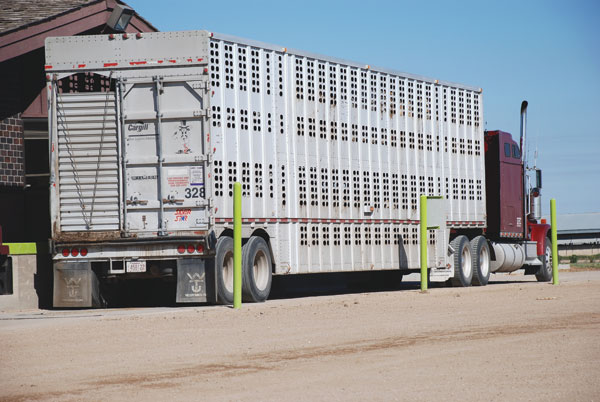
You’ve weaned your 2015 spring-born calves by now and probably have made your marketing decision for those calves. The biggest handicap in marketing your 2015 calves, however, may well be the recall of marketing your 2014 calves.
It’s hard not to compare potential marketing prices for your 2015 calves with the prices you received for your 2014 calves. I, too, have this same problem. What we all should do, however, is put 2014 behind us and focus our attention on the 2015-2016 marketing picture.
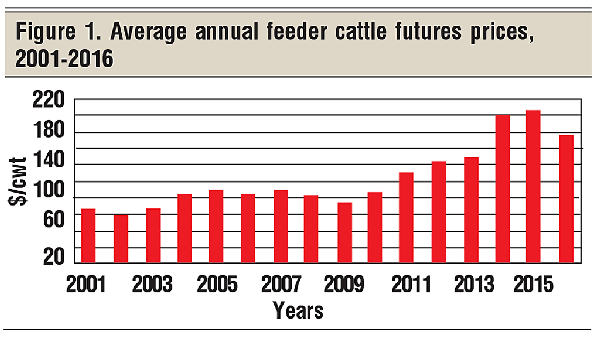
Let’s take a look at that 2015-2016 marking picture. Market analysts frequently look at average annual prices when analyzing marketing conditions. Figure 1 presents the annual feeder cattle futures prices based on the average of mid-month values for 800- to 850-pound feeders. It is hard to believe that 2015 January through October futures prices averaged higher than 2014 futures prices January through December, but they did.
Most beef cow producers do not market year-round, so let’s take a look at 2015 fall marketing prices. My price analysis suggests that mid-October 2015 feeder futures were the second-highest on record (Figure 2). There is nothing wrong with earning the second-highest net returns on record with your 2015 calves. The record-setting year was 2014, and we will tell our grandkids about running beef cows in 2014.
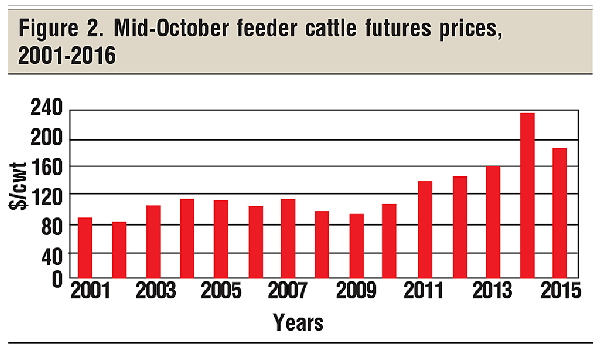
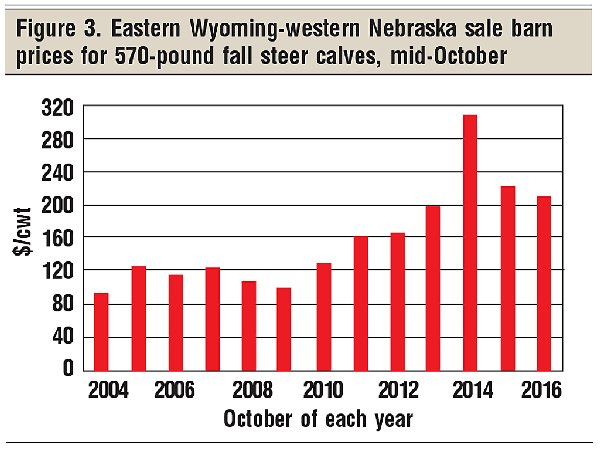
Let’s get a closer look at marketing 2015 weaned calves. Figure 3 presents my calculated eastern Wyoming-western Nebraska sale barn prices for each mid-October from 2004, through 2016 projections. Year 2014 clearly stands out and is projected to be the unusual year in this decade. The trend line for this annual data slopes upward $12.92 per year — pretty darn good! In fact, year 2015’s weaning price — the second-highest price on record — was right on the trend line.
Now turn to eastern Wyoming-western Nebraska mid-October 2015 weaning prices. Figure 4 presents sale barn feeder calf prices in western Nebraska for mid-October 2015. (The magazine went to press before mid-November prices were available.)
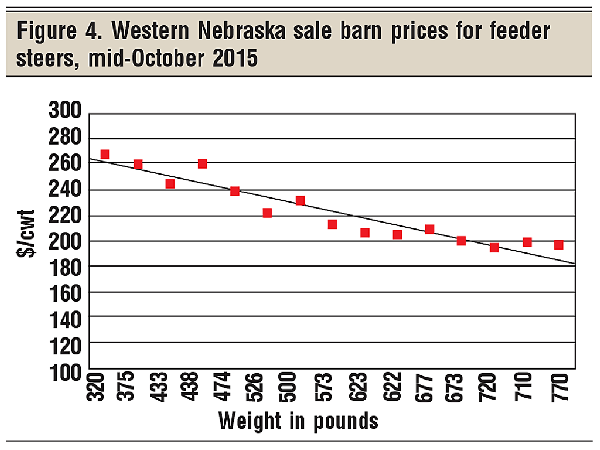
Two things stand out with respect to these 2015 fall weaning prices. First, prices varied considerably around the trend line, reflecting considerable difference in quality of the feeder steers. Second, the slope of the linear price line is a minus $5.38 per each added 100 pounds of steer calf weight. A constant price slide, such as the minus $5.38 over such a wide weight range, is not very realistic.
Refining this price line by removing the impact of feeder quality and acknowledging that price slides vary with the weight of feeder cattle, Figure 5 was statistically calculated. I use this market price equation in Figure 5 to represent western Nebraska market prices for weaned steer calves in mid-October 2015. Feeder quality has been standardized, and price slides are allowed to vary with the weight of feeder calves.
Based on this data, my eastern Wyoming-western Nebraska study herd marketed its 584-pound steer calves for $218 per cwt this year. Space does not allow me to present the price slides represented in Figure 5.
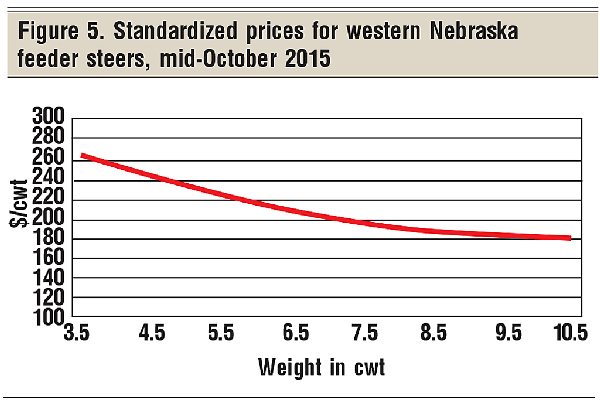
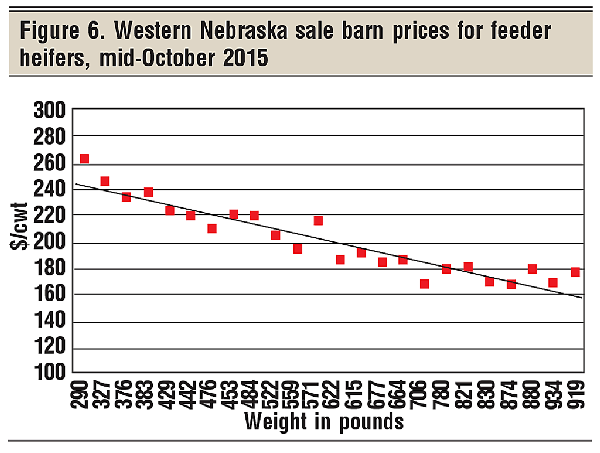
Mid-October feeder heifer prices showed a slightly different picture. Figure 6 presents the linear price line showing the impact of varying quality factors associated with the sale of feeder heifers. As can be seen by the point variations around the trend line, heifer quality also varied considerably. The slope of the linear price line for heifers was a minus $3.60 per each additional 100 pounds.
Figure 7 presents the western Nebraska mid-October heifer calf prices standardized for quality, and where price slides can vary with the weight of heifers. Heifers weighing 550 pounds averaged $201 per cwt. My eastern Wyoming-western Nebraska study herd marketed its 554-pound heifer calves for $198 per cwt.
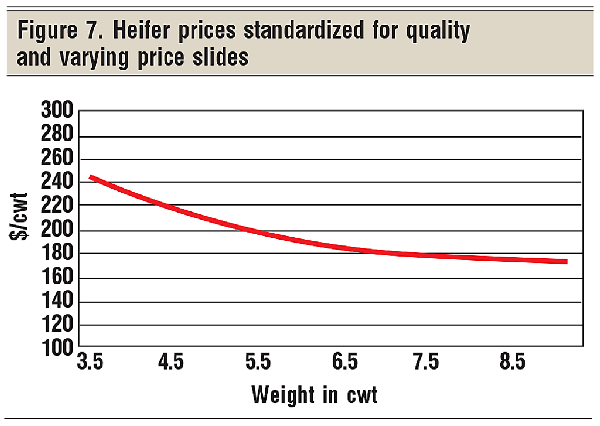
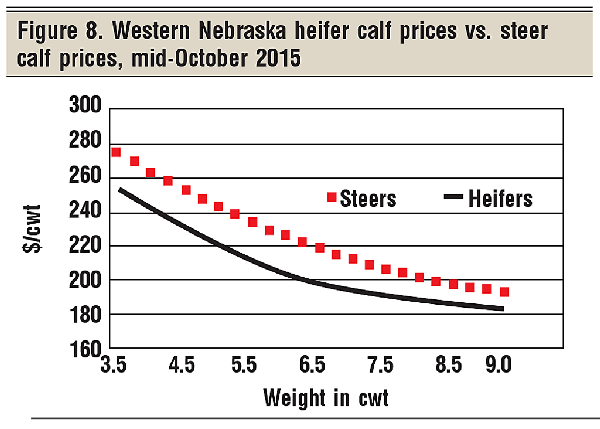
One of my surprises when studying these western Nebraska feeder prices was the large heifer price discount relative to steers for mid-October 2015 (Figure 8). The average heifer discount for the total price range of the chart is $18 per cwt. If I just focus on 500- to 700-pound heifers, the market discount averaged $21.28 per cwt. These heifer discounts are much larger than normal. I can only speculate as to why.
Harlan Hughes is a North Dakota State University professor emeritus. He lives in Kuna, Idaho. Reach him at 701-238-9607 or [email protected].
Photo Gallery: Laugh with Rubes cow cartoons
Cattle feeders are enduring record losses
Feed and bed your cows without all the waste
Did USDA open the door to animal rights groups?
Want a more efficient cowherd? Start with early-born heifers
60 stunning photos that showcase ranch work ethics
2016 weather outlook: Is drought in the forecast?
About the Author(s)
You May Also Like




.png?width=300&auto=webp&quality=80&disable=upscale)
